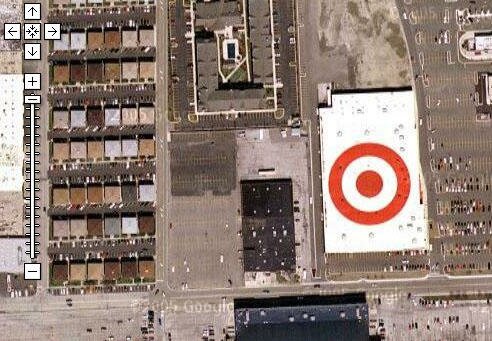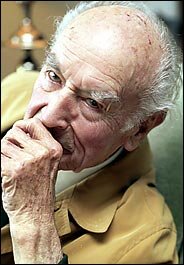January 2006
Monthly Archive
Thu 26 Jan 2006
Web game provides breakthrough in predicting spread of epidemics
Posted by glenn under
Science
Science Blog, via BoingBoing, reports:
Using a popular internet game that traces the travels of dollar bills, scientists have unveiled statistical laws of human travel in the United States, and developed a mathematical description that can be used to model the spread of infectious disease in this country. This model is considered a breakthrough in the field.
“We were confident that we could learn a lot from the data collected at the www.wheresgeorge.com bill-tracking website, but the results turned out far beyond our expectations,” said Lars Hufnagel, a post-doctoral fellow at the Kavli Institute for Theoretical Physics at the University of California, Santa Barbara and co-author of an article describing the research in the January 26 issue of the journal Nature.
(more…)
Thu 26 Jan 2006
Sex ‘cuts public speaking stress’
Posted by glenn under
Sex
The BBC reports:
Forget learning lines or polishing jokes - having sex may be the best way to prepare for giving a speech.
New Scientist magazine reports that Stuart Brody, a psychologist at the University of Paisley, found having sex can help keep stress at bay.
However, only penetrative intercourse did the trick - other forms of sex had no impact on stress levels at all.
(more…)
Mon 23 Jan 2006
Vatican ‘cashes in’ by putting price on the Pope’s copyright
Posted by glenn under
Culture
Richard Owen in Rome, The Times Online (UK), reports:
THE Vatican has been accused of trying to cash in on the Pope’s words after it decided to impose strict copyright on all papal pronouncements.
For the first time all papal documents, including encyclicals, will be governed by copyright invested in the official Vatican publishing house, the Libreria Editrice Vaticana.
The edict covers Pope Benedict XVI’s first encyclical, which is to be issued this week amid huge international interest. The edict is retroactive, covering not only the writings of the present pontiff — as Pope and as cardinal — but also those of his predecessors over the past 50 years. It therefore includes anything written by John Paul II, John Paul I, Paul VI and John XXIII.
The decision was denounced yesterday for treating the Pope’s words as “saleable merchandise” and endangering the Church’s mission to “spread the Christian message”.
A Milanese publishing house that had issued an anthology containing 30 lines from Pope Benedict’s speech to the conclave that elected him and an extract from his enthronement speech is reported to have been sent a bill for €15,000 (£10,000). This was made up of 15 per cent of the cover price of each copy sold plus “legal expenses” of €3,500.
(more…)
Sun 22 Jan 2006
Mood-altering cat parasites make women friendly and men into jerks
Posted by glenn under
Science
On Boing Boing, Cory Doctorow writes:
A parasite that causes rats to sacrifice themselves to cats may also change human behavior, making women more outgoing and warmhearted, and men more jealous and suspicious. The Toxoplasma bacteria is shed in cat feces, which are eaten by rats; infected rats become fearless in the presence of cats, which makes them easier to catch, which, in turn spreads the disease to new cats.
Carl Zimmer is the author of Parasite Rex, a sharp science book dealing with the amazing ways that parasites attack us, change us, farm us, use us and kill us. He reports on new research on the effect of Toxoplasma bacteria on humans.
Toxoplasma was previously believed to be largely harmless to humans (though it can compromise our immune systems). But new research suggests that humans, like rats, go through behavioral changes when infected with the parasite, though the effects are opposite in women and men.
Regular BB readers will remember my review of Scott Westerfeld’s Peeps, a young-adult vampire novel largely inspired by Parasite Rex, in which all of the behaviors attributed to vampires are explained in parasitological terms.
Some scientists believe that Toxoplasma changes the personality of its human hosts, bringing different shifts to men and women. Parasitologist Jaroslav Flegr of Charles University in Prague administered psychological questionnaires to people infected with Toxoplasma and controls. Those infected, he found, show a small, but statistically significant, tendency to be more self-reproaching and insecure. Paradoxically, infected women, on average, tend to be more outgoing and warmhearted than controls, while infected men tend to be more jealous and suspicious.
Sat 21 Jan 2006
Peeling bananas from the other end is easier
Posted by glenn under
General
On BoingBoing, Mark Frauenfelder writes:
I’ve been opening my bananas stem-side first all my life. On Friday, David showed me how monkeys open bananas. They pinch them on the other end. Boy, it’s a lot easier. I’ll never open a banana the dumb way again.
Reader comment: Kevin says: “I learned this genius monkey technique a few years ago and it was a defining moment in my life. An added bonus is that the stem end of the banana pops out easily once you’ve eaten down that far.”
Fri 20 Jan 2006
PINNACLE/NUCFLASH
Posted by glenn under
Info War
Bill Gurstelle, via BoingBoing, writes:
[..]
PINNACLE/NUCFLASH is the military communications code word designation that instructs all military communication personnel to stop whatever else they’re doing and transmit the message that immediately, because there’s some bad news, really, really bad news that you need to act on right now.
There is a set of instructions that describes exactly how information relating to military threats to the USA is designated, prioritized, and delivered. The rules are spelled out in precise military fashion in a document called OPREP-3, the US Military’s written guideline for operational reports relating to important events involving nuclear weapons.
“PINNACLE/NUCFLASH” are the flagwords or header that presages an electronic transmission through the U.S. military’s command and control structure that reports an actual or possible detonation of a nuclear weapon. Not only that, these code words mean that the explosion was not an accident and the risk of nuclear war is imminent.
As one might expect, “PINNACLE/NUCFLASH” has the highest precedence in the OPREP-3 reporting structure. Men and women train for months, years, in order to be able to coolly and efficiently handle the communications that follow an OPREP-3 PINNACLE level flagword. There are several OPREP-3 code word designators with a chilling cold war/Tom Clancy/John Lecarre ring to them. None of these foreshadow good news. I’ll write more on those later.
Fri 20 Jan 2006
Posted by glenn under
Info Tech
WebSiteOptimization, reports:
Web users form first impressions of web pages in as little as 50 miliseconds (1/20th of a second), according to Canadian researchers. In the blink of an eye, web surfers make nearly instantaneous judgments of a web site’s “visual appeal.” Through the “halo effect” first impressions can color subsequent judgments of perceived credibility, usability, and ultimately influence our purchasing decisions. Creating a fast-loading, visually appealing site can help websites succeed.
(more…)
Thu 19 Jan 2006
20 Years of Computer Viruses
Posted by glenn under
Info Tech
The Register (UK), via Slashdot, reports:
Today, 19 January is the 20th anniversary for the appearance of the first PC virus. Brain, a boot sector virus, was let loose in January 1986. Brain spread via infected floppy disks and was a relatively innocuous nuisance in contrast with modern Trojan, rootkits and other malware. The appearance of the first Windows malware nonetheless set in train a chain of events that led up to today’s computer virus landscape.
(more…)
Tue 17 Jan 2006
Stores paint ads on roofs for satellite map services
Posted by glenn under
Internet

BoingBoing reports:
Some commercial outfits are painting giant ads on their roofs for the benefit of the aerial/satellite photos used by services like Google Earth/Google Maps
Mon 16 Jan 2006
Thousands of Mongolians protest corruption
Posted by glenn under
Government

About 2,000 people gathered in the main square of Mongolia’s capital on Monday, demanding their president resign. (AP)
The Associated Press reports:
ULAN BATOR, Mongolia About 2,000 people rallied in the central square of Mongolia’s capital on Monday in a new wave of protests over official corruption, demanding the resignation of the country’s president and dissolution of parliament.
Hundreds of people gathered in Ulan Bator’s vast central square at noon (0400GMT), and roared their approval as protest leaders called out for the resignation of President Nambaryn Enkhbayar, who they called “the father of corruption.”
(more…)
Wed 11 Jan 2006
Blazing mouse sets fire to house
Posted by glenn under
News
The BBC reports:
A US man who threw a mouse onto a pile of burning leaves could only watch in horror as it ran into his house and set the building ablaze.
Luciano Mares, 81, of Fort Sumner, New Mexico, found the mouse in his home and wanted to get rid of it.
“I had some leaves burning outside, so I threw it in the fire, and the mouse was on fire and ran back at the house,” he was quoted as saying by AP.
Though no-one was injured, the house and everything in it was destroyed.
“I’ve seen numerous house fires, but nothing as unique as this one,” Fire Department Captain Jim Lyssy said.
New Mexico has seen several major blazes after unseasonably dry and windy conditions which have destroyed 10 homes and devastated more than 53,000 acres (21,200 hectares) of land.
Sun 8 Jan 2006
Nearly 100, LSD’s Father Ponders His ‘Problem Child’
Posted by glenn under
Drugs
 “LSD spoke to me. He came to me and said, ‘You must find me.’ He told me, ‘Don’t give me to the pharmacologist.’” - ALBERT HOFMANN
“LSD spoke to me. He came to me and said, ‘You must find me.’ He told me, ‘Don’t give me to the pharmacologist.’” - ALBERT HOFMANN
(Photo by Marc Latzel/Lookat)
CRAIG S. SMITH in BURG, Switzerland, The New Yoek Times, reports:
ALBERT Hofmann, the father of LSD, walked slowly across the small corner office of his modernist home on a grassy Alpine hilltop here, hoping to show a visitor the vista that sweeps before him on clear days. But outside there was only a white blanket of fog hanging just beyond the crest of the hill. He picked up a photograph of the view on his desk instead, left there perhaps to convince visitors of what really lies beyond the windowpane.
Mr. Hofmann will turn 100 on Wednesday, a milestone to be marked by a symposium in nearby Basel on the chemical compound that he discovered and that famously unlocked the Blakean doors of perception, altering consciousnesses around the world. As the years accumulate behind him, Mr. Hofmann’s conversation turns ever more insistently around one theme: man’s oneness with nature and the dangers of an increasing inattention to that fact.
“It’s very, very dangerous to lose contact with living nature,” he said, listing to the right in a green armchair that looked out over frost-dusted fields and snow-laced trees. A glass pitcher held a bouquet of roses on the coffee table before him. “In the big cities, there are people who have never seen living nature, all things are products of humans,” he said. “The bigger the town, the less they see and understand nature.” And, yes, he said, LSD, which he calls his “problem child,” could help reconnect people to the universe.
(more…)


 “LSD spoke to me. He came to me and said, ‘You must find me.’ He told me, ‘Don’t give me to the pharmacologist.’” - ALBERT HOFMANN
“LSD spoke to me. He came to me and said, ‘You must find me.’ He told me, ‘Don’t give me to the pharmacologist.’” - ALBERT HOFMANN
